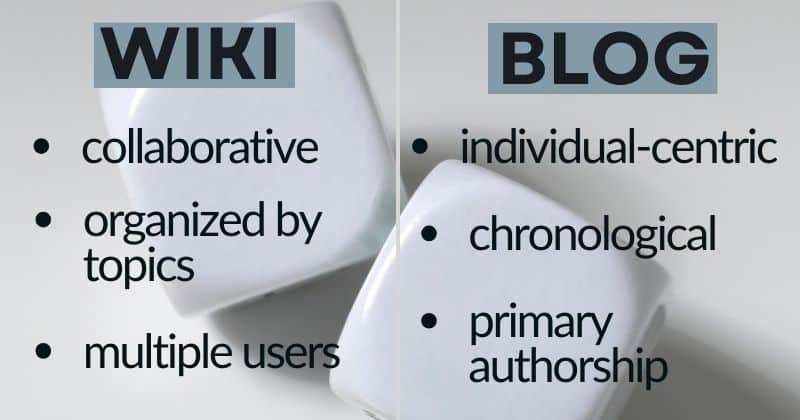Distinguishing between a wiki and a blog is essential for digital content creators. Wikis and blogs are fundamental to online information sharing, yet they fulfill distinct roles and attract diverse audiences. Wikis are known for their collaborative format and extensive information networks, offering a stark contrast to blogs’ personalized, narrative-driven approach.
For bloggers like myself, selecting the appropriate platform is crucial. Wikis excel through community-driven updates and broad topic coverage, making them ideal for educational and reference needs. Conversely, blogs present personal or team perspectives, often tailored to a specific style or brand, suitable for storytelling, marketing, or personal anecdotes.
Recognizing these differences aids in efficiently sourcing information. Whether after community-verified details or individual insights, understanding wikis and blogs ensures you find the right information where it matters most.
What is a Wiki?
A Wiki is a web-based platform that allows users to collaboratively create, edit, and link pages together. It’s designed for communal information sharing and editing, making it ideal for knowledge bases, community projects, and educational purposes.
What is a Blog?
A blog is a type of website where content is presented in a journal-like format, typically updated regularly with new posts. Blogs can be personal or professional, focusing on a wide range of topics and often allowing reader interaction through comments.
What is the Difference between a Wiki and a Blog?
A wiki is a collaborative platform enabling multiple users to edit and update content collectively, often used for information sharing and documentation. A blog is a personal or corporate website with regularly updated posts reflecting the author’s views or news on specific subjects.

In online content creation, various platforms are available for bloggers to share information and ideas. These platforms include websites, blogging platforms, and wiki software. Two popular options are wikis and blogs. While they may seem similar initially, key differences set them apart.
Collaborative Content Creation vs Individual Focus
Wikis are all about collaboration. They provide a space where multiple users can collectively contribute, edit, and update content using Wiki software. This allows for easy sharing of knowledge and encourages collaboration.
MediaWiki is a popular example of such software. Additionally, this platform can also be used for blogging purposes. It’s like a community project where everyone contributes ideas and expertise using Wiki software and blogging to create something together.
On the other hand, blogging tends to be more individual-centric. Blogs are a type of site that allows individuals to share their ideas. Unlike wiki software, which is more collaborative in nature, blogging is focused on individual expression.
Blogging is a popular form of online communication where individuals use wiki software, such as MediaWiki, to share information and their thoughts, experiences, or expertise with an audience.
Chronological Structure vs Topic Organization
Blogging platforms, such as MediaWiki, utilize wiki software to display posts in reverse chronological order on the web. The most recent entry is typically shown first.
Blogging is like reading someone’s journal or diary in which they share their thoughts as they happen over time. With wiki software, you can easily create and organize information in a step-by-step format. In contrast, wikis organize information by topics or categories rather than chronology.
It’s like having different sections in a book dedicated to specific subjects so readers can easily find what they want.
Easy Editing by Multiple Users vs Primary Authorship
One of the defining features of wikis is the ease of editing by multiple users. Anyone accessing the wiki can make changes, add content, or update information.
It’s like collaborating on a Google Doc where everyone can edit simultaneously. Conversely, blogs usually have one primary author who controls the content and decides what gets published on their platform.
While both wikis and blogs are valuable tools for sharing information online, understanding their differences is crucial in choosing the right platform for your needs.
Practical Applications of Wikis and Blogs

Wikis and blogs serve different purposes and can be used in various ways to provide relevant information. Let’s explore some practical applications for both platforms:
Knowledge Sharing with Wikis
Wikis are commonly used within organizations or communities to facilitate knowledge sharing. They provide a collaborative platform where people can collectively contribute, edit, and update information. Some practical applications of wikis include:
- Creating an internal knowledge base for employees to access important resources, documents, or procedures.
- Building a community-driven encyclopedia or reference guide on specific topics.
- Collaboratively creating documentation for software development projects.
Personal Expression and Expertise Sharing with Blogs
Conversely, blogs are often utilized for personal expression, storytelling, or sharing niche expertise. Here are some practical applications of blogs:
- Personal blogging: Individuals can share their thoughts, experiences, hobbies, or creative work through blog posts.
- Niche expertise sharing: Experts in specific fields can use blogs to share their knowledge and insights with a wider audience.
- Business blogging: Companies can maintain a blog to engage with customers, provide updates about products/services, or establish thought leadership.
Educational Uses of Wikis and Blogs
Both wikis and blogs have educational applications as well. They can be used to create interactive learning materials that promote student collaboration and engagement. Some examples include:
- Collaborative group projects: Students can use wikis to collaborate on research projects or create shared presentations.
- Student portfolios: Blogs offer a platform for students to showcase their work over time by publishing reflections, essays, artwork, etc.
- Classroom discussions: Teachers can use either platform to facilitate online discussions where students share ideas and insights.
Guidance on When to Use a Wiki or Blog

If you’re wondering about the difference between a wiki and a blog, it’s important to consider your specific needs and goals. Here is some guidance on when to use a wiki or blog platform.
Collaborative Knowledge Building: Wiki
A wiki might be the best choice if collaboration and collective knowledge building are essential for your project or organization.
Wikis allow multiple users to contribute and edit content, making them ideal for creating shared resources, documentation, or knowledge bases. With wikis, everyone can have a hand in building and refining information.
Pros of using a wiki:
- Enables collaborative editing by multiple users.
- Facilitates collective knowledge sharing and building.
- Allows for version control and tracking changes over time.
Cons of using a wiki:
- May require moderation to maintain accuracy and quality.
- Can be overwhelming with too many contributors.
- Requires user familiarity with the wiki platform.
Personal Branding and Unique Perspectives: Blog
On the other hand, if you want to establish your personal brand or share your unique perspective on specific topics, then a blog is the way to go.
Blogs allow individuals to showcase their expertise, thoughts, and experiences. They offer more control over content creation and allow you to engage directly with your audience through comments.
Pros of using a blog:
- Provides a platform for personal expression.
- Helps establish credibility and authority in your field.
- Offers direct interaction with readers through comments.
Cons of using a blog:
- Requires consistent content creation.
- May have limited collaboration options compared to wikis.
- Relies heavily on individual effort for promotion and engagement.
Control and Flexibility Considerations
When deciding between a wiki or blog platform, evaluating the level of control and flexibility needed is crucial.
Wikis generally have more structured formats that prioritize collaboration but may limit customization options. Blogs offer greater design and content presentation freedom but may have fewer collaboration features.
Examples of Successful Wikis and Blogs
Let’s look at examples of successful wikis and blogs to understand the difference between these platforms.
Wikipedia
Wikipedia is an iconic example of a successful wiki platform with extensive user-generated content. It is a collaborative encyclopedia where anyone can contribute and edit articles.
With millions of articles in multiple languages, Wikipedia has become a go-to source for information on various topics.
The Huffington Post
The Huffington Post is renowned as one of the most influential blogs covering various subjects. Started by Arianna Huffington, this blog features articles from expert contributors covering news, politics, entertainment, lifestyle, and more. It has gained popularity for its engaging content and diverse perspectives.
Wikimedia Commons
Wikimedia Commons is an example of how wikis can be used to curate media files collaboratively. It is a free repository that allows users to upload, share, and reuse images, videos, and other media files across different Wikimedia projects like Wikipedia. This collaborative effort ensures a vast collection of multimedia resources available to users worldwide.
These examples highlight the distinct nature of wikis and blogs. While wikis focus on collaboration and knowledge-sharing through user-generated content like encyclopedic articles or media files, blogs are more personalized platforms where individuals or groups express their thoughts or expertise on specific subjects.
Your Turn
Understanding the difference between a wiki and a blog clarifies the diverse pathways for sharing knowledge and personal insights online. While wikis unite communities around collaborative content creation, blogs serve as a platform for individual expression and connection, each catering to distinct needs and goals.
Reflect on your objectives: Are you aiming to build a comprehensive knowledge base with input from many, or do you wish to carve out a personal or professional niche through storytelling and engagement? Choose the platform that aligns with your vision and start shaping the digital narrative. Your unique contribution, whether enriching a wiki or personalizing a blog, is invaluable.
FAQs
How are wikis and blogs different from each other?
Wikis are collaborative platforms allowing multiple users to edit and contribute content focused on comprehensive information sharing. Blogs are managed by individuals or small teams, presenting personal viewpoints or detailed narratives on specific topics. Both serve distinct informational and engagement purposes.
Can anyone edit a blog like they can with a wiki?
Blogs typically restrict editing privileges to the blog’s owner or designated authors, unlike wikis, where content can be edited by any user with access rights, emphasizing collaborative input and information sharing.
Which platform should I use: wiki or blog?
Choose a wiki for collaborative, community-driven content creation and information sharing. Opt for a blog if seeking to publish personal insights, narratives, or curated content under a specific authorship or brand identity. Each platform serves distinct communication and engagement purposes.
What is the difference between a wiki and a Web page?
A wiki is a collaborative platform that allows multiple users to create, edit, and manage content together, focusing on shared knowledge. In contrast, a Web page is a single document on the internet, typically controlled and updated by an individual or organization.
What are the similarities between a blog and a wiki?
Blogs and wikis both serve as platforms for online content sharing and information dissemination. They facilitate user engagement, knowledge exchange, and are integral to web-based communication, despite their operational and authorship differences.
What is the difference between Web pages wikis and weblogs?
Web pages are static content published on the internet. Wikis allow collaborative editing and contribution by multiple users. Weblogs (blogs) are regularly updated by individuals or teams, focusing on personal insights or themed content. Each has a unique purpose and audience engagement strategy.



